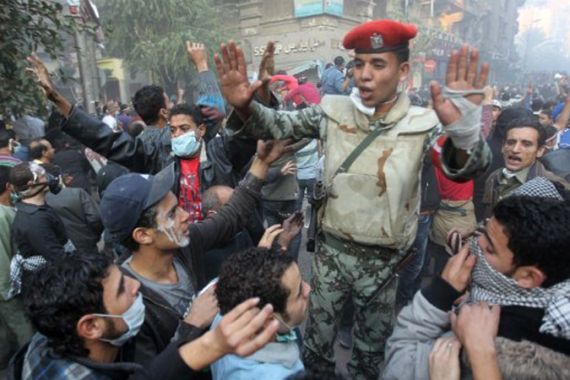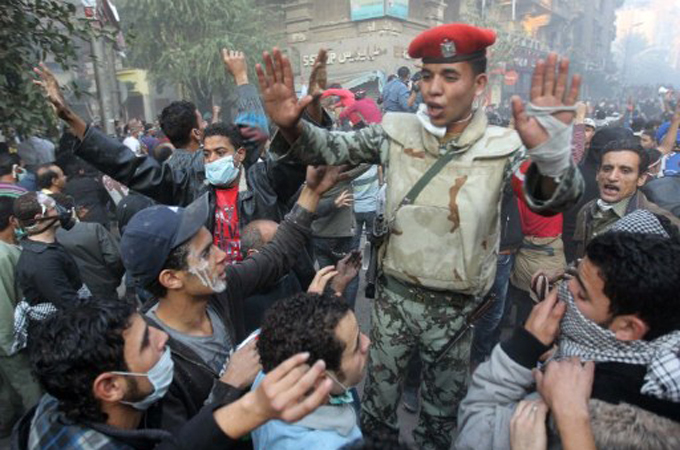Survey shows declining trust in Egyptian army
Survey reveals country still split in its attitude to the military, with many still seeing it as a stabilising force.

 |
| A soldier appeals to protesters in Cairo. A survey suggests mounting scepticism of the military in Egypt [AFP] |
Trust in Egypt’s military, which has faced down a week of ongoing protests, has declined sharply since the country first erupted into protest in January, but many Egyptians still believe the army is a source of stability, according to data accumulated for Al Jazeera’s Vote Compass .
Although around 51 per cent of respondents said they distrusted the military, more than 40 per cent said they would like to see the army intervene in politics if it had to in order to restore order.
Trust is likewise divided when it comes to Egypt’s business class, state-run media and police. Although faith in the police and businessmen is nearly evenly split, 60 per cent of those who have participated in Vote Compass’ survey so far said they distrusted state-run media.
The judiciary is the lone institution in the country that enjoys broad legitimacy, according to the survey results. Nearly 80 per cent of those who responded said they trusted in Egypt’s judges. Private media outlets came in second to the judiciary, earning around 63 per cent support.
Opinions of the army break down along political lines. Around 56 per cent of respondents who support the well-established, secular and conservative Wafd Party, which was long accused of working closely with the regime of Hosni Mubarak, the former president toppled in a popular uprising in February, also supported army political intervention.
But only 36 per cent of those who support the Muslim Brotherhood’s Freedom and Justice Party also support military intervention.
Egypt’s military was widely feted for its role in the toppling of Hosni Mubarak, the former president, in February.
Since then, the country has been ruled by a military council, but perceived delays in the return of power into civilian hands, and scepticism over the military’s intentions, have triggered days of protests and street battles between demonstrators and security forces in Cairo’s Tahrir Square.
On Thursday, the military council issued an apology over the clashes which left 38 people dead and more than 3,000 injured.
A University of Maryland poll released this month also identified a slide in Egyptians’ opinion of the military, finding that 43 per cent believed the military was “working to slow or reverse the gains” of the uprising that overthrew Mubarak, according to Ahram Online.
The survey, which covered five Arab nations and interviewed 750 Egyptians in six cities, found that 21 per cent believed the military was trying to advance the gains of the uprising while another 14 per cent believed it was indifferent.
More than 43,000 people have so far used Vote Compass’ Egyptian elections tool, which helps voters find the party that best matches their views.
Respondents were notably skewed toward Egypt’s urban areas, where the majority of the population lives. One third of those who filled out the questionnaire live in Cairo, the capital, while another 14 per cent live in Alexandria, Egypt’s second-largest city.
Three other locales had at least 500 respondents: Giza, as the western side of Cairo is known, Mansoura, a mid-sized city in the Nile Delta, and Tanta, a smaller town near Mansoura.